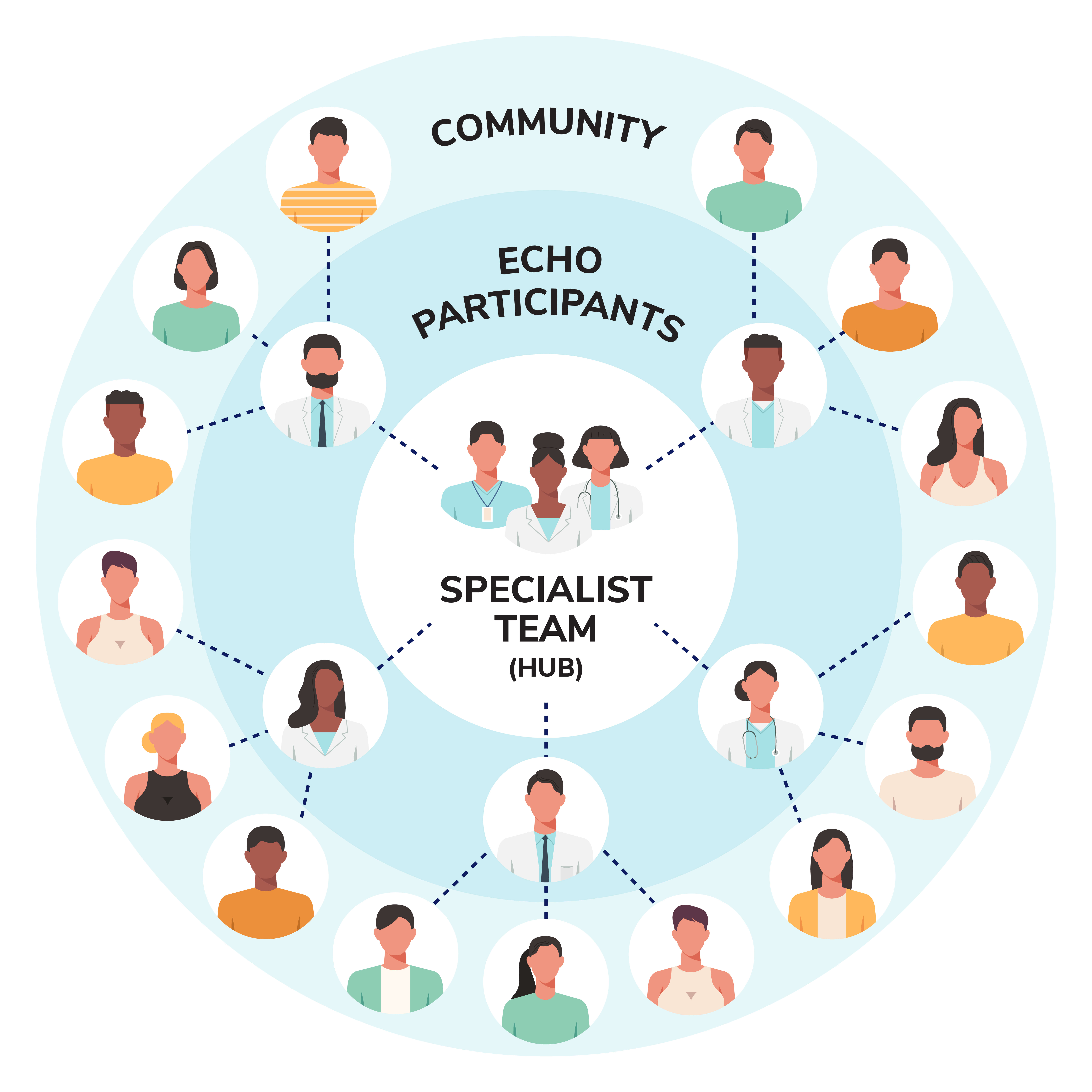Project ECHO

Project ECHO (Extensions for Community Healthcare Outcomes) was first conceived in 2003 by Dr. Sanjeev Arora, a physician at the University of New Mexico, who was looking for a way to scale up health expertise for the management of hepatitis in remote, underserved communities. The model has since been replicated in over 800 programs in 39 countries. Project ECHO covers various topics, such as autism, chronic pain, mental health and addictions, geriatric care and pediatric care.
- In 2014 the first Project ECHO was launched in Canada on chronic pain and opioid stewardship by Dr. Andrea Furlan, a clinician and senior scientist at the University Health Network and a scientist at the Institute for Work & Health, with Dr. Ruth Dubin of Queen’s University. This was the first ECHO of its kind in the world.
- In 2018, an ECHO Ontario “super-hub”” was established to support new ECHO projects throughout Ontario and assist with launching ECHO across other Canadian centres.
Project ECHO Manitoba
Why in Manitoba and what goals do we want to accomplish?
- Manitoba has evolving needs and we need to modernize care delivery approaches to increase reach and access from a patient and provider perspective.
- The ECHO model bridges the gap between primary care providers, paraprofessionals and specialists to standardize and innovate how care is delivered in order to achieve better health outcomes across the province.
- ECHO functions to connect providers from across the province to:
- Develop a mental health and addictions community of practice to increase collaboration and communication between primary care providers, paraprofessionals and specialists.
- Build mental health and addictions competency among all front-line providers.
- Transfer skills, knowledge and expertise to better support complex clients.
What is ECHO?
- The ECHO model is grounded on the premise “All Teach, All Learn”, which allows for a continuous loop of learning, mentoring, competency building and peer support for long-lasting impact on the care and support provided to clients across the province.
- The model is founded on a hub-and-spoke knowledge sharing network where health-care professionals from diverse backgrounds share their knowledge and expertise and learn from each other
- The knowledge-sharing model brings together specialists from across the province to form multiple focus areas for a robust and holistic approach.
The Impact of the ECHO Model
How do ECHO Sessions Work?
- Health-care providers register for ECHO sessions at no cost.
- During a multipoint videoconferencing ECHO session, a participant presents a real (anonymized) case to a variety of specialists, and each other, to share best practices, jointly discuss recommendations for complex client care and build sustainable communities of practice.
- Participants acquire new skills, knowledge and overall competency building which can have a direct impact on client care.
This continuous loop of learning, mentoring and peer support builds new skills, insights and overall competency in mental health and addictions. At the same time, clients supported by healthcare providers in ECHO receive the care and support they need at the right time and place. Health-care providers can also share best practices, reducing regional disparities and improving access to quality care within Manitoba, improving the health and wellbeing of individuals and communities across the province.

Who can attend ECHO sessions?
ECHO sessions will cover a broad range of topics that can be attended by health-care professionals across the province. The target provider populations are specified for each ECHO topic.
Resource Library
- ECHO Grand Rounds Presentation Video | PDF
- ECHO Research Poster
- There is a growing body of research that demonstrates the effectiveness of the ECHO model across disciplines, including health care and education.
Upcoming Sessions
View all upcoming ECHO sessions on our Upcoming Sessions page.
